The Comma
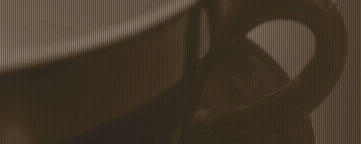
A man said Why, why does traveling
in cars and in trains make him feel sad,
a beautiful sadness.
I’ve felt this before.
It’s the people in the cities you’ll never know,
it is everything you pass by,
wondering will you ever return.
Last weekend, I had the pleasure of attending the 2nd annual Juniper Creek Writers Conference in Carson City with Chris Bernard, comrade and co-editor at Caveat Lector. More on the actual conference in future entries -- it deserves to be spread out over a few posts. Today, on a more personal note, I'm preoccupied with traveling, chance meetings, destinations modest yet surprising.
I'm a better person when I travel -- of that I have no doubt. Annoyances that set my blood boiling on an everyday basis -- traffic jams, erratic weather, finding myself lost on unknown, crowded avenues -- gain romance and significance when I'm away from home. The phrase "with a full heart" is oft-overused, but it seems entirely appropos when I'm on the road, as I attain a state of hyper-awareness, receptive and happy to accept everything. The unexpected pleasure of stumbling upon a location or a moment, the sunlight captured just so, or a snatch of random music from a passing car or reverberating from within a bar, exchanged talk among passersby, whether it's a familiar or foreign tongue -- it's during these collisions of happenstance that I feel most alive, down to the atom. And yet, these moments always have a bittersweet quality for me -- I know that soon I will depart, unknown date of return, and within a day or so, I'll be back to my usual addled existence here in San Francisco, oblivious to the same little joys I hoard during my travels. Am I spoiled? Lazy? Immature? Maybe.
I have an obsession for settings -- in my writing, in my life. Some have accused me, with good reason, of being more interested in places than people. People vacillate, promise something one moment and flake the next, or they simply outgrow you, and vice versa. But places are more glacial and constant. Some of the most moving moments I've experienced have come when I revisit an old vista, or note the disappearance of a familiar landmark or building. While we humans bustle and dissipate and scatter energy into the ether, the streets and cafes, the hotel rooms with their particular scents, the hills that roll away into mist and smog, all do their best to anchor us, fight the good fight against entropy.
Sometimes a synchronicity occurs, where all the senses plus memory plus the present seem to merge, a specific spot, something overheard, a smell, it all comes together, with the presence of an actual human to top it off. Such is what happened to me in Carson City.
Carson City shows signs of the suburbanization that threatens to calcify our nation -- you have your malls, the Safeways and gas stations, the vast aisles of car dealerships -- but the downtown preserves the charm of some of the old architecture, mostly in the government structures (as I thought as I ambled past the Nevada State Attorney's office: "That must be the easiest job in the country").
 |
And then there is Comma Coffee on South Carson Street, near the corner of West 3rd Street. The blurb on their site sums it up best: "IF LIFE WERE A SENTENCE, Comma Coffee would be the comma... the pause... the breath... the break between two thoughts." Chris and I stopped there early Saturday morning for our breakfast at 7:30 -- entirely too early to be doing anything, but we had a panel to attend at 9:00, so no choice. The interior wouldn't raise the eyebrows of any big-city denizen, but compared to the rest of Carson City, it was a hive of idiosyncrasy -- honeycombed bookshelves, couches and chairs artfully arranged like someone's homey little living room, the menu scribbled neatly above and behind the front counter, an adjoining outdoor courtyard for Third World music performances. New, razor-creased copies of the Nevada Appeal sat on a nearby shelf. Despite the superficial resemblance to your standard San Francisco coffee joint, this was a different animal: no hoards of in-a-hurry professionals, no aged hipsters holding court, hardly anyone at all. Just a few quiet customers, enjoying a coffee or muffin, everyone quietly minding their own business, no ostentation, nothing but the bare essentials of a pleasant Saturday morning.
So I went up to the counter and ordered some scrambled eggs and toast (known as the "(simple~eggs~planation)"), and iced tea, and for the first time, I noticed the woman behind the counter. She had been sweeping by the front door when we arrived, and greeted us with a laid-back "How are you guys doing?" but now that she was facing me, I was struck by her. Compared to any number of women who I had already seen on the trip, there was nothing especially striking about her. She had blond, stringy hair, sleepy eyes, and some of my friends who would have a field day debating semantics over her "healthy" or "heavy" appearance. But there was something genuine about her manner, her smile, that caught me.
She reminded me of a girl named Kris Koch that I knew back in Cortland, New York, when I was 18 and spending two weeks at music camp (for those dirty minds in the audience, no, no "band camp" stories to report -- the closest it got was when a 12-year old girl from NYC named Melanie got an unhealthy (unrequited) crush on me, and apparently set the girl's bathroom on fire shortly after I left the camp). Kris was a year younger than me, from the local area, and I would learn that to make ends meet she had to waitress in a skimpy outfit at some down-and-grungy bar. She played saxophone and flute, and she seemed to walk everywhere in bare feet. We were all sequestered at the SUNY Cortland campus, which was basically a single isolated street of classroom buildings and a cafeteria, and forbidden to access the outside world. This particularly gnawed at me since I was older than all of the camp counselors by at least two years (I should have looked more closely at the photos of all the 10 and 12-year olds when I signed up for the camp).
If you asked me to recount a particular conversation or moment with Kris during the two weeks I was at that camp, I couldn't tell you, but I remember the bare feet, the way she slumped a bit as she walked, her big eyes and nose, and yes, the genuine manner and smile. My last vision of her is when I departed from camp (she stayed on for another two weeks), and she stood on the curb to watch me depart. In the rear view mirror, I could see the clouds breaking gray above the curb, the wistful look on her face.
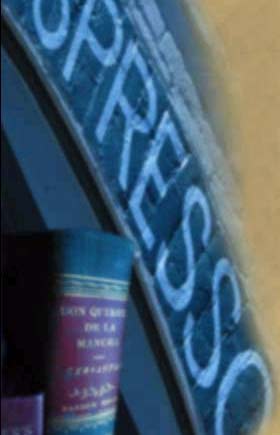 |
There's a postscript to the Kris story that I'll save for another time, but the woman at Comma Coffee conjured up a similar emotion. Was it a longing for a particular kind of person, or a time, or maybe even a life? I grew up in Albany, the lap of suburbia, but have always had an affection for rural environments, or maybe more specifically, the people from those environments. I might not see eye-to-eye with them on interests or politics, but I appreciate their solidity, their small kindnesses, their willingness not to judge, or at least keep it politely to themselves. A while back, my friend Kerwin So and I were talking about this very subject, and he mentioned that he could see these same traits in the Goo Goo Dolls, one of upstate New York's proudest exports. He had a point: Yeah, maybe the Goo Goo Dolls are hair-gelled sellouts, but there's still a kernel of sincerity, of naivete in the midst of their calculation. I still respond to it when I see it in others.
And so there I was, smack dab in the Nevada desert, a bit tired, ultrasensitive to the environment after an abbreviated night of sleep, but this woman at the counter affected me. 70s soft rock was playing on the sound system, I made the pretense of reading the newspaper and checking out local real estate prices (as is my habit no matter where I travel -- some people collect keychains or postcards, but I collect real estate catalogs), and I couldn't help glancing at her behind that counter, her head now resting at an angle on her folded arms, recalling the bored storekeepers of childhood stories. If I were a different person, I'd sidle up to her, engage her in conversation, maybe even risk giving her my business card. Or if I were really different, I could have tried the line: I'm an indie filmmaker, would you be interested in being in a movie? Or further: a date to meet later that day, after the conference? Nothing but honorable intentions, a dinner, maybe walking down those streets, so beaten and bright during the day but soothing and intimate at night, with those cool breezes, the sounds of the street bands piping in like birdcalls. Conversation, sharing histories, dreams, even commonalities, if I could be so bold to believe. And what would come of it all? Maybe a connection, maybe an agreement to meet again someday, here in Carson City or over in San Francisco, and then --
But as it often does, something between resignation and cynicism took hold: No point, she lives here, you live there, and even if what you're imagining is fact, and she's not merely being nice just to be nice (as Vernon Silver, one-time executive editor of the Brown Daily Herald, said to me once, "Just because someone is nice doesn't mean that they're actually nice"), then what? Different worlds.
All this crossed my mind in a manner of seconds, and the remaining time in the cafe was a big feedback loop, deliberations colliding with temperance, fantasies splashed on with cold water. As Annie Savoy once said, the world is made for people who aren't cursed with self-awareness. The time came to leave, and as Chris and I walked out, she called out to us, "Thanks a lot guys, have a great day." I turned as I said thanks, just half-turned, looking at her through the corner of my eye, and I could have sworn she was looking at Chris, or maybe she smiling at something just beyond both of us, outside the door, out there in the city. It was a look that shouldn't have had anything of import assigned to it, but somehow it made my heart ache. If I had the wherewithal or foresight, I would have had my camera with me, and taken a few shots of the cafe, of her. But instead I sit here in this blessedly cool San Francisco evening, reflecting on something that didn't happen, the memory already fading into the netherworld between reality and augmented fantasy, and no doubt many would say I'm taking the easy way out, making hay of pain and failure, but this is my therapy, and it's cheap. So here's to you, the women of Comma Coffee. May all your days be as redolent of dreams and alternative lives, and bittersweet as that Saturday morning was for me.

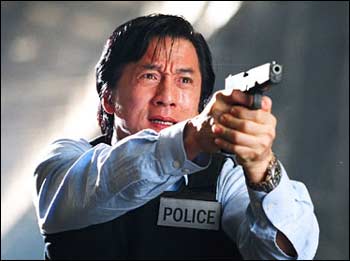
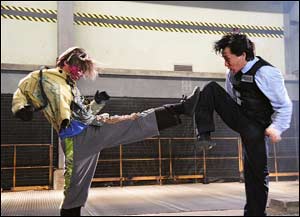
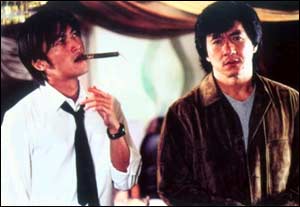
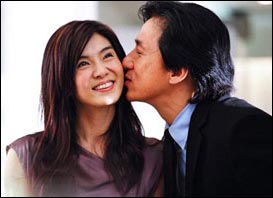
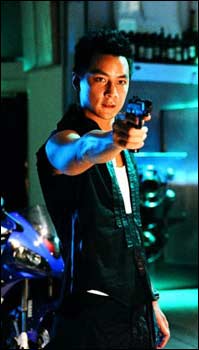
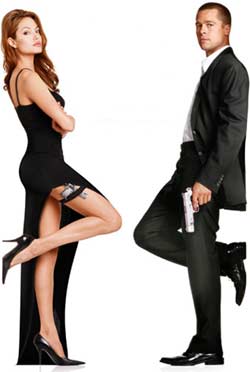
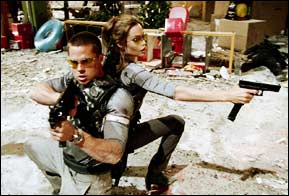
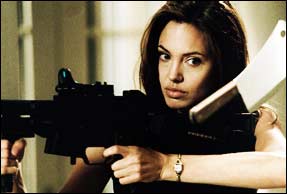 What to make of Angelina? I must admit, I've never quite understood her charms. Those bee-stung lips would certainly arrest anyone's attention, and her body -- voluptuous yet angular -- is its own special effect. However, for a superstar, there is something detached and incomplete about her performances. Usually she comes under fire for her vogue-like pouts -- nearly every shot of her in this movie seems like it was set up with an album cover in mind -- but I find those less troubling than her unconvincing stabs at method acting (at one point, I felt like chastising the makeup people for not importing enough fake tears). Brad just gives up entirely, underplaying his role to near invisibility, marble-mouthing his lines. He functions best when a film lays siege to his macho virility, as in David Fincher's
What to make of Angelina? I must admit, I've never quite understood her charms. Those bee-stung lips would certainly arrest anyone's attention, and her body -- voluptuous yet angular -- is its own special effect. However, for a superstar, there is something detached and incomplete about her performances. Usually she comes under fire for her vogue-like pouts -- nearly every shot of her in this movie seems like it was set up with an album cover in mind -- but I find those less troubling than her unconvincing stabs at method acting (at one point, I felt like chastising the makeup people for not importing enough fake tears). Brad just gives up entirely, underplaying his role to near invisibility, marble-mouthing his lines. He functions best when a film lays siege to his macho virility, as in David Fincher's 